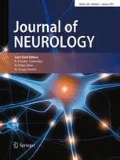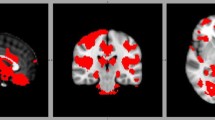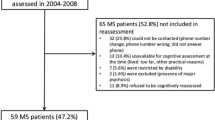Abstract
Cognitive impairment (CI) may occur in clinically isolated syndrome (CIS) patients. While the relationship between CI and magnetic resonance imaging (MRI) has been investigated extensively in multiple sclerosis (MS), MRI correlates of CI in CIS patients are unknown. To investigate the evolution of CI and to determine brain MRI structural correlates associated with CI in CIS patients. This prospective 24-month observational study examined 81 CIS patients treated with 30 µg of intramuscular interferon beta 1a once a week. MRI acquisition and neuropsychological (NP) assessment were performed at baseline, 6, 12 and 24 months. Participants were tested with Czech-validated version of Minimal Assessment of Cognitive Function in MS battery and MRI measures of lesion activity and burden, and global, tissue-specific and regional brain atrophy were performed. Over 24 months, 36 CIS patients developed clinically definite MS (CDMS). CI was observed in 10 (12.3 %) CIS patients at baseline and at the 24 months follow-up. Eight CIS patients changed their CI status over the follow-up (four improved and four worsened). No significant difference in development of CI was detected between stable CIS patients and those who developed CDMS. In multivariate regression and mixed-effect model analyses, no significant relationship was found between NP and MRI parameters. The lack of significant relationship between MRI metrics and cognition in this group of CIS patients could be attributed to several factors including the cognitive reserve, effect of disease-modifying therapy and relatively short follow-up period.

Similar content being viewed by others
References
Benedict RH, Zivadinov R (2011) Risk factors for and management of cognitive dysfunction in multiple sclerosis. Nat Rev Neurol 7:332–342
Morrow SA, Drake A, Zivadinov R, Munschauer F, Weinstock-Guttman B et al (2010) Predicting loss of employment over three years in multiple sclerosis: clinically meaningful cognitive decline. Clin Neuropsychol 24:1131–1145
Blahova Dusankova J, Kalincik T, Dolezal T, Kobelt G, Havrdova E (2012) Cost of multiple sclerosis in the Czech Republic: the COMS study. Multiple Scler 18:662–668
Langdon DW (2011) Cognition in multiple sclerosis. Curr Opin Neurol 24:244–249
Rao SM, Leo GJ, Bernardin L, Unverzagt F (1991) Cognitive dysfunction in multiple sclerosis. I. Frequency, patterns, and prediction. Neurology 41:685–691
Glanz BI, Holland CM, Gauthier SA, Amunwa EL, Liptak Z et al (2007) Cognitive dysfunction in patients with clinically isolated syndromes or newly diagnosed multiple sclerosis. Multiple Scler 13:1004–1010
Viterbo RG, Iaffaldano P, Trojano M (2013) Verbal fluency deficits in clinically isolated syndrome suggestive of multiple sclerosis. J Neurol Sci 330:56–60
Feuillet L, Reuter F, Audoin B, Malikova I, Barrau K et al (2007) Early cognitive impairment in patients with clinically isolated syndrome suggestive of multiple sclerosis. Multiple Scler 13:124–127
Benedict RH, Fischer JS, Archibald CJ, Arnett PA, Beatty WW et al (2002) Minimal neuropsychological assessment of MS patients: a consensus approach. Clin Neuropsychol 16:381–397
Zipoli V, Goretti B, Hakiki B, Siracusa G, Sorbi S et al (2010) Cognitive impairment predicts conversion to multiple sclerosis in clinically isolated syndromes. Multiple Scler 16:62–67
Reuter F, Zaaraoui W, Crespy L, Faivre A, Rico A et al (2011) Cognitive impairment at the onset of multiple sclerosis: relationship to lesion location. Multiple Scler J 17(6):755–758
Achiron A, Chapman J, Magalashvili D, Dolev M, Lavie M et al (2013) Modeling of cognitive impairment by disease duration in multiple sclerosis: a cross-sectional study. PLoS ONE 8:e71058
Potagas C, Giogkaraki E, Koutsis G, Mandellos D, Tsirempolou E et al (2008) Cognitive impairment in different MS subtypes and clinically isolated syndromes. J Neurol Sci 267:100–106
Achiron A, Barak Y (2003) Cognitive impairment in probable multiple sclerosis. J Neurol Neurosurg Psychiatry 74:443–446
Penner IK, Stemper B, Calabrese P, Freedman MS, Polman CH et al (2012) Effects of interferon beta-1b on cognitive performance in patients with a first event suggestive of multiple sclerosis. Multiple Scler 18:1466–1471
Rao SM, Leo GJ, Haughton VM, St Aubin-Faubert P, Bernardin L (1989) Correlation of magnetic resonance imaging with neuropsychological testing in multiple sclerosis. Neurology 39:161–166
Zivadinov R, Sepcic J, Nasuelli D, De Masi R, Bragadin LM et al (2001) A longitudinal study of brain atrophy and cognitive disturbances in the early phase of relapsing-remitting multiple sclerosis. J Neurol Neurosurg Psychiatry 70:773–780
Amato MP, Portaccio E, Goretti B, Zipoli V, Battaglini M et al (2007) Association of neocortical volume changes with cognitive deterioration in relapsing-remitting multiple sclerosis. Arch Neurol 64:1157–1161
Benedict RH, Bruce JM, Dwyer MG, Abdelrahman N, Hussein S et al (2006) Neocortical atrophy, third ventricular width, and cognitive dysfunction in multiple sclerosis. Arch Neurol 63:1301–1306
Houtchens MK, Benedict RH, Killiany R, Sharma J, Jaisani Z et al (2007) Thalamic atrophy and cognition in multiple sclerosis. Neurology 69:1213–1223
Benedict RH, Hulst HE, Bergsland N, Schoonheim MM, Dwyer MG et al (2013) Clinical significance of atrophy and white matter mean diffusivity within the thalamus of multiple sclerosis patients. Multiple Scler 19:1478–1484
Schoonheim MM, Popescu V, Rueda Lopes FC, Wiebenga OT, Vrenken H et al (2012) Subcortical atrophy and cognition: sex effects in multiple sclerosis. Neurology 79:1754–1761
Reuter F, Zaaraoui W, Crespy L, Faivre A, Rico A et al (2011) Frequency of cognitive impairment dramatically increases during the first 5 years of multiple sclerosis. J Neurol Neurosurg Psychiatry 82:1157–1159
Summers M, Swanton J, Fernando K, Dalton C, Miller DH et al (2008) Cognitive impairment in multiple sclerosis can be predicted by imaging early in the disease. J Neurol Neurosurg Psychiatry 79:955–958
Zivadinov R, Havrdova E, Bergsland N, Tyblova M, Hagemeier J et al (2013) Thalamic atrophy is associated with development of clinically definite multiple sclerosis. Radiology 268:831–841
Henry RG, Shieh M, Okuda DT, Evangelista A, Gorno-Tempini ML et al (2008) Regional grey matter atrophy in clinically isolated syndromes at presentation. J Neurol Neurosurg Psychiatry 79:1236–1244
Kalincik T, Vaneckova M, Tyblova M, Krasensky J, Seidl Z et al (2012) Volumetric MRI markers and predictors of disease activity in early multiple sclerosis: a longitudinal cohort study. PLoS ONE 7:e50101
Horakova D, Zivadinov R, Weinstock-Guttman B, Havrdova E, Qu J et al (2013) Environmental factors associated with disease progression after the first demyelinating event: results from the multi-center SET study. PLoS ONE 8:e53996
Browne RW, Weinstock-Guttman B, Horakova D, Zivadinov R, Bodziak ML et al (2014) Apolipoproteins are associated with new MRI lesions and deep grey matter atrophy in clinically isolated syndromes. J Neurol Neurosurg Psychiatry. doi:10.1136/jnnp-2013-307106
Benedict RH, Cookfair D, Gavett R, Gunther M, Munschauer F et al (2006) Validity of the minimal assessment of cognitive function in multiple sclerosis (MACFIMS). J Int Neuropsychol Soc JINS 12:549–558
Dusankova JB, Kalincik T, Havrdova E, Benedict RH (2012) Cross cultural validation of the minimal assessment of cognitive function in multiple sclerosis (MACFIMS) and the brief international cognitive assessment for multiple sclerosis (BICAMS). Clin Neuropsychol 26:1186–1200
Dwyer MG, Bergsland N, Zivadinov R (2013) Improved longitudinal gray and white matter atrophy assessment via application of a 4-dimensional hidden Markov random field model. Neuroimage 90:207–217
Smith SM, Zhang Y, Jenkinson M, Chen J, Matthews PM et al (2002) Accurate, robust, and automated longitudinal and cross-sectional brain change analysis. Neuroimage 17:479–489
Polman CH, Reingold SC, Edan G, Filippi M, Hartung HP et al (2005) Diagnostic criteria for multiple sclerosis: 2005 revisions to the “McDonald Criteria”. Ann Neurol 58:840–846
Polman CH, Reingold SC, Banwell B, Clanet M, Cohen JA et al (2011) Diagnostic criteria for multiple sclerosis: 2010 revisions to the McDonald criteria. Ann Neurol 69:292–302
Feinstein A, Kartsounis LD, Miller DH, Youl BD, Ron MA (1992) Clinically isolated lesions of the type seen in multiple sclerosis: a cognitive, psychiatric, and MRI follow up study. J Neurol Neurosurg Psychiatry 55:869–876
Amato MP, Bartolozzi ML, Zipoli V, Portaccio E, Mortilla M et al (2004) Neocortical volume decrease in relapsing-remitting MS patients with mild cognitive impairment. Neurology 63:89–93
Sepulcre J, Vanotti S, Hernandez R, Sandoval G, Caceres F et al (2006) Cognitive impairment in patients with multiple sclerosis using the brief repeatable battery-neuropsychology test. Multiple Scler 12:187–195
Sumowski JF, Leavitt VM (2013) Cognitive reserve in multiple sclerosis. Multiple Scler 19:1122–1127
Fischer JS, Priore RL, Jacobs LD, Cookfair DL, Rudick RA et al (2000) Neuropsychological effects of interferon beta-1a in relapsing multiple sclerosis. Multiple Sclerosis Collaborative Research Group. Ann Neurol 48:885–892
Benedict RH, Morrow SA, Weinstock Guttman B, Cookfair D, Schretlen DJ (2010) Cognitive reserve moderates decline in information processing speed in multiple sclerosis patients. J Int Neuropsychol Soc JINS 16:829–835
Amato MP, Razzolini L, Goretti B, Stromillo ML, Rossi F et al (2013) Cognitive reserve and cortical atrophy in multiple sclerosis: a longitudinal study. Neurology 80:1728–1733
Jonsson A, Andresen J, Storr L, Tscherning T, Sorensen PS et al (2006) Cognitive impairment in newly diagnosed multiple sclerosis patients: a 4-year follow-up study. J Neurol Sci 245:77–85
Glanz BI, Healy BC, Hviid LE, Chitnis T, Weiner HL (2012) Cognitive deterioration in patients with early multiple sclerosis: a 5-year study. J Neurol Neurosurg Psychiatry 83:38–43
Bartley AJ, Jones DW, Weinberger DR (1997) Genetic variability of human brain size and cortical gyral patterns. Brain J Neurol 120(Pt 2):257–269
Sumowski JF, Chiaravalloti N, Wylie G, Deluca J (2009) Cognitive reserve moderates the negative effect of brain atrophy on cognitive efficiency in multiple sclerosis. J Int Neuropsychol Soc JINS 15:606–612
Morrow SA, Weinstock-Guttman B, Munschauer FE, Hojnacki D, Benedict RH (2009) Subjective fatigue is not associated with cognitive impairment in multiple sclerosis: cross-sectional and longitudinal analysis. Multiple Scler 15:998–1005
Acknowledgments
The authors thank the patients who participated in this study. We thank the other Clinical Centers and investigators who participated in the SET study: (1) M. Vachova, S. Machalicka, and J. Kotalova from KZ a.s. Hospital, Teplice; (2) Y. Benesova, P. Praksova, and P. Stourac from University Hospital, Brno, Bohunice; (3) M. Dufek from St. Anne’s University Hospital, Brno; (4) E. Meluzinova, J. Pikova, and E. Houzvickova from Charles University in Prague, 2nd Faculty of Medicine, Motol; (5) D. Zimova from Charles University in Prague, 3rd Faculty of Medicine, Kralovske Vinohrady; (6) J. Sucha from University Hospital, Plzen; (7) V. Sladkova and J. Mares from University Hospital, Olomo. The SET study was supported by Czech Ministries of Education and Health (NT13237-4/2012, PRVOUK-P26/LF1/4, RVO-VFN64165/2012) and Biogen Idec.
Conflicts of interest
Dr. Blahova Dusankova, Mr. Bergsland, Mr. Hagemeier, and Dr. Ramasamy report no disclosures. Dr. Uher received financial support for conference travel and honoraria from Biogen Idec. Dr. Horakova received compensation for travel, speaker honoraria and consultant fees from Biogen Idec, Novartis, Merck Serono, Bayer Shering, and Teva as well as support for research activities from Biogen Idec. Dr. Tyblova received compensation for travel and honoraria from Biogen Idec, Sanofi Aventis, Teva, and Merck Serono. Dr. Benedict has acted as a consultant or scientific advisory board member for Bayer, Biogen Idec, Actelion, and Novartis. He receives royalties from Psychological Assessment Resources, Inc. He has received financial support for research activities from Shire Pharmaceuticals, Accorda and Biogen Idec. Dr. Kalincik received compensation for conference travel and honoraria from Novartis, Biogen Idec, Sanofi Aventis, Teva, and Merck Serono. Drs. Seidl, Vaneckova, and Krasensky received financial support for research activities from Biogen Idec. Dr. Havrdova received speaker honoraria and consultant fees from Biogen Idec, Merck Serono, Novartis, Genzyme, and Teva as well as support for research activities from Biogen Idec and Merck Serono. Dr. Zivadinov received financial support for research activities from Teva Pharmaceuticals, Biogen Idec, Claret Medical, Genzyme, Novartis, and Greatbatch. He received personal compensation from Biogen Idec, Novartis, Genzyme, and EMD Serono for speaking and consultant services.
Ethical standard
All human studies have been approved by the appropriate ethics committee and have therefore been performed in accordance with the ethical standards laid down in the 1964 Declaration of Helsinki.
Author information
Authors and Affiliations
Corresponding author
Rights and permissions
About this article
Cite this article
Uher, T., Blahova-Dusankova, J., Horakova, D. et al. Longitudinal MRI and neuropsychological assessment of patients with clinically isolated syndrome. J Neurol 261, 1735–1744 (2014). https://doi.org/10.1007/s00415-014-7413-9
Received:
Revised:
Accepted:
Published:
Issue Date:
DOI: https://doi.org/10.1007/s00415-014-7413-9




